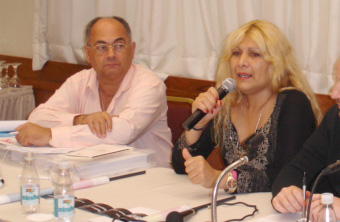
Feature Story
Fighting stigma against sexual minorities in Latin America
19 September 2006
19 September 2006 19 September 2006Marcela Romero became a woman in heart, soul and body at the age of 17. This decision changed her life completely. No longer would ‘Marcelo’ (her name at birth) be the favourite uncle or pride of the family. Instead Marcela faced scorn and rejection.
“Knowing that your family wishes you had never existed or listening to the constant question what did I do to have a person like this in the family is very painful,” Marcela explained.
After having to drop out from school in Argentina due to reaction to her new appearance, Marcela was forced to sell sex to survive financially. During this time, Marcela became HIV positive.
Marcela’s experiences are typical of transsexuals in Latin America and other parts of the world as they face rejection from their families, marginalization within wider society and other forms of stigma and discrimination.

Marcela Romero (right of photograph), Coordinator of the Latin American Transsexual Network (REDLACTRANS)
“This is the reality of the gay, lesbian and transsexual population in Latin America. We are permanently treated as fascinating objects for investigation or contempt and not as individuals with rights,” said Marcela, explaining that despite her wish to be considered a woman, she is still obliged to carry and present her male identification papers to keep within the country’s law. In Latin America, stigma and discrimination of sexual minorities often goes hand in hand with HIV-related discrimination.
“Sexual violence is a reality for many sexual minorities and often sex work is the only viable option to make a living for transgender and transsexual people who are marginalized in mainstream society. Unless HIV prevention and stigma eradication programmes are designed by and for these communities they will continue to be more vulnerable to HIV,” said UNAIDS Head of Civil Society Partnerships, Andy Seale.
Marcela is working hard with others in the same situation as her to respond to and reduce the kind of stigma and discrimination she faces every day. As coordinator of the Latin American Transsexual Network (REDLACTRANS), she recently took part in a meeting in Brazil, in which other representatives from more than 20 Latin American countries gathered to address the issue of discrimination against sexual minorities and its effects on the AIDS response.

(right to left): Dr Pedro Chequer, UNAIDS Country Coordinator for Argentina, Chile, Uruguay and Paraguay; Marcela Romero, Coordinator of the Latin American Transsexual Network (REDLACTRANS)
Within the discussions at the meeting, a strategic guidebook to help fight discrimination against sexual minorities, and reduce its impact on HIV, was presented for discussion. “This guidebook will be a useful instrument for countries, especially those that lack on legislations and laws that ensure the basic human rights to these important populations,” said Pedro Chequer, UNAIDS Country Coordinator for Argentina, Chile, Uruguay and Paraguay. More than 80 countries around the world, especially in Asia, Africa, Central America and the Caribbean, currently punish homosexuality as a crime.
The meeting was an initiative of the Horizontal Technical Cooperation Group (HTCG), that comprises more than 21 Latin American countries, and the UNAIDS Regional Support Team for Latin America. The guidebook is expected to be ready for distribution later this year.
“We are committed to stopping the crimes and abuses against gay, lesbian and transsexual populations which can lead to a higher HIV risk. This goal can only be achieved through public policies that respect sexual orientation and human rights,” said Carlos Passarelli, HTCG’s Joint Director.
Arturo Diaz, from the Mexican non-governmental organization, Letra S, stated that this type of discrimination “affects the daily lives of the gay, lesbian and transsexual populations in personal, emotional and professional aspects, as well as health”.
As stated in the Declaration of Commitment on AIDS, UNAIDS is working on initiatives to join efforts with governments, civil society and the media of all the Latin American countries to fight stigma and discrimination through coordinated action as part of a wide response to the AIDS epidemic.
The path ahead is long, but as Marcela has seen, stigma and discrimination can be broken down gradually, moving towards the ultimate goal of total eradication. “Before only my best friend would accept me, now my Mum has started to come around as well,” she said. “Things are changing – it’s little by little, but they are changing for the better.”
Related links
Horizontal Technical Cooperation Group of Latin America and the Caribbean on HIV/AIDS
Letra S
PAHO - HIV/AIDS-Related Stigma and Discrimination in the Health Sector
PAHO - Estigma y Discriminación por el VIH/SIDA en el Sector Salud
PAHO - Time to Stop Homophobic Crimes in Latin America and the Caribbean
PAHO - Es hora de poner fin a los crímenes homofóbicos en AMÉrica Latina y el Caribe



